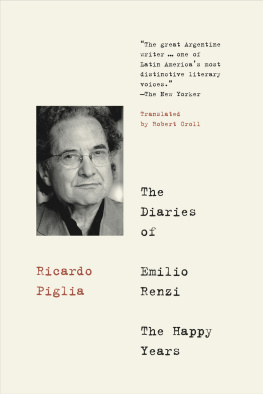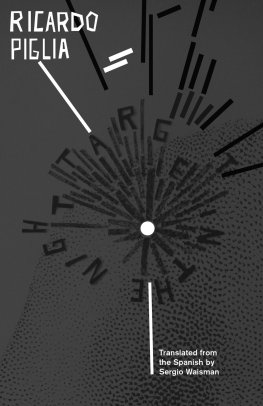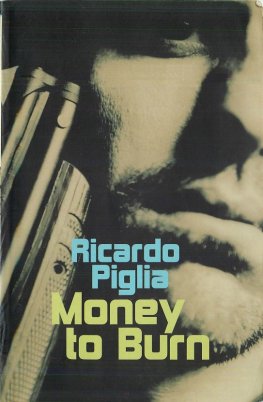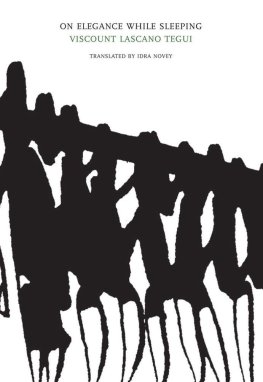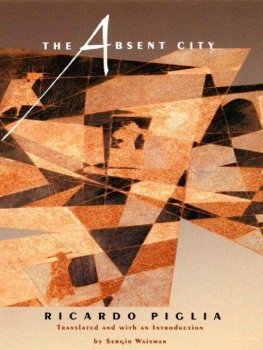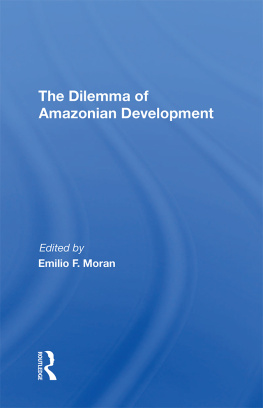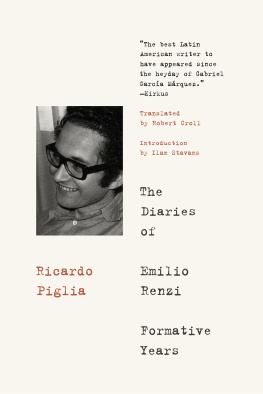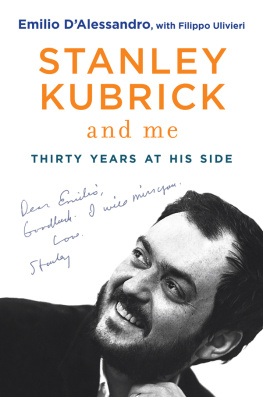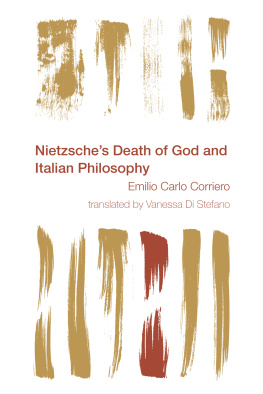Praise for
The Diaries of Emilio Renzi
Formative Years
Splendidly crafted and interspliced with essays and stories, this beguiling work is to a diary as Piglia is to Emilio Renzi: a lifelong alter ego, a highly self-conscious shadow volume that brings to bear all of Piglias prowess as it illuminates his process of critical reading and the inevitable tensions between art and life. No previous familiarity with Piglias work is needed to appreciate these bibliophilic diaries, adroitly repurposed through a dexterous game of representation and masks that speaks volumes of the role of the artist in society, the artist in his time, the artist in his tradition. Piglias delusion of living in the third person to avoid the illusion of an interior life transmogrifies us as well, into the character of the reader, and that feeling is priceless.
Mara Faye Lethem, The New York Times Book Review
When young Ricardo Piglia wrote the first pages of his diaries, which he would work on until the last years of his life, did he have any inkling that they would become a lesson in literary genius and the culmination of one of the greatest works of Argentine literature?
Samanta Schweblin, author of Fever Dream
A valediction from the noted Argentine writer, known for bringing the conventions of hard-boiled U.S. crime drama into Latin American literature. Lennui, cest moi . First-tier Argentine novelist Piglias ( Money to Burn , 2003, etc.) literary alter ego, Emilio Renzi, was a world-weary detective when he stepped into the spotlight in the claustrophobic novel Artificial Respiration , published in Argentina in 1981 and in the U.S. in 1994, a searching look at Buenos Aires during the reign of the generals. Here, in notebooks begun decades earlier but only shaped into a novel toward the end of Piglias life, Renzi is struggling to forge a career as a writer. The story takes a few detours into the metaits a nice turn that Renzi, himself a fictional writer, learns what I want to do from imaginary writers. Stephen Dedalus or Nick Adams, for examplebut is mostly straightforward, reading just like the diary it purports to be. Fans of Cortzar, Donoso, and Gabriel Garca Mrquez will find these to be eminently worthy last words from Piglia, who died at the beginning of 2017.
Kirkus Reviews , Starred Review
In this fictionalized autobiography, Piglias ability to succinctly criticize and contextualize major writers from Kafka to Flannery OConnor is astounding, and the scattering of those insights throughout this diary are a joy to read. This book is essential reading for writers.
Publishers Weekly
Where others see oppositions, great writers see the possibility of intertwining forking paths. Like kids in front of a stereogram, they are able to shift their gaze in ways that allow them to read the history of literature otherwise and, in doing so, write beyond the dead end of tradition. Ricardo Piglia, the monumental Argentine writer whose recent death coincided with increasing recognition of his work in the English-speaking world, was without a doubt one of these great visionaries. It was said that there lay hidden something more impressive than his transgressive novels or his brilliant critical essays, a secret work of even more transcendence: his diaries. In the tradition of Pavese, Kafka, and Gombrowicz, the diaries were the culmination of a life dedicated to thinking of literature as a way of life.
Carlos Fonseca, Literary Hub
It almost seems as though Piglia has perfected the form of the literary authors diary, leaving in enough mundane life details to give a feeling of the messy, day-to-day livedness of a diary, but also providing this miscellany with something of a shape, and with a true intellectual heft. In these pages we see the formation of a formidable literary intelligencethe brief reflections on genre, Kafka, Beckett, Dashiell Hammett, Arlt, and Continental philosophy alone are worth the price of admissionbut we also see heartbreak, familial drama, reflections on life, small moments of great beauty, the hopes and anxieties of a searching young man, the endless monetary woes of one dedicated to the literary craft, and the drift of a nation whose flirtation with fascism takes it on a dangerous course.
Scott Esposito, BOMB Magazine
As a fictionalized autobiography, it is, like the work of Karl Ove Knausgaard, of My Struggle fame, part confession and part performance. Renzi meets and corresponds with literary luminaries like Borges, Cortzar, and Mrquez, and offers insightful readings of Dostoevsky, Kafka, Faulkner, and Joyce. Fans of W. G. Sebald and Roberto Bolao will find the first installment in Piglias trilogy to be a fascinating portrait of a writers life.
Alexander Moran, Booklist
In the long history of novelists and their doubles, doppelgngers, and alter egos, few have given more delighted attention to the problem of multiplicity than the Argentine novelist Ricardo Emilio Piglia Renzi. Under the name of Ricardo Piglia he published a sequence of acrobatic, dazzling novels and stories that consistently featured a novelist called Emilio Renzi. The larger story of Formative Years reads something like a roman dapprentissage : the romance of a writers vocation, in all its hubris and innocent corruption. [T]he books real subject is more delicate and more moving than the simple story of a literary vocation. It is the process of textualization, of the stuttering, hesitant way a writer tries to convert life into literature. In these diaries, Piglia is dramatizing not only the writers split between a public and private self, but also the time-consuming, exhausting, delicious, compromised effort to construct that textual self: the self that exists only in words. Formative Years is one of the great novels of youth: its boredom, powerlessness, desperation, strategizing, delusion this journal impassively records not only a novelists self-creation, but a societys unraveling.
Adam Thirlwell, The New York Review of Books
Also by Ricardo Piglia
The Diaries of Emilio Renzi: Formative Years
The Diaries of Emilio Renzi: A Day in the Life
Artificial Respiration
Money to Burn
Target in the Night
The Absent City
Contents
The Diaries of Emilio Renzi
The Happy Years
In the Bar
A life is not divided into chapters, Emilio Renzi said to the bartender of El Cervatillo that afternoon, leaning on the bar, standing before the mirror and the bottles of whiskey, vodka, and tequila lined up on the shelves. Ive always been intrigued by the unreal yet mathematical way we organize the days, he said. Take the almanac, a senseless prison around experience that imposes a chronological order onto a period of time that flows without criteria. Calendars imprison the days, and this mania with classification has likely influenced human morals, Renzi told the bartender, smiling. I say so for my own part, he said, since I write a diary, and diaries obey only the progression of days, months, and years. Nothing else can define a diarynot its autobiographical material, not the private confessions, not even the record of a persons life. Simply, said Renzi, the definition is that what is written must be organized by the days of the week and the months of the year. Thats all, he said, satisfied. You can write anything, a mathematical progression, for example, or a laundry list, or a meticulous account of a conversation in a bar with the Uruguayan man tending the bar, or, as in my case, an unexpected mixture of details, or meetings with friends, or the testimony of lived experiences; you can write down all of that, but it will be a diary if and only if you note the day, the month, the yearany of those three means of orienting yourself amid the violent currents of time. If I write, for example, Wednesday, January 27, 2015 and then write down a dream or memory beneath this heading, or if I imagine something that hasnt actually happened but make a note before I start the entry that says Wednesday 27 , for example, or, even shorter, just Wednesday , it has now become a diary and neither a novel nor an essay, although it can include novels and essays as long as you take the precaution of writing the date first, orienting yourself and creating a sense of serialism, but then, look out, he saidand he touched the index finger of his left hand to the lower eyelid of his right eyeif you publish these notes according to the calendar and with your own name, that is, if you assert that the subject who is speaking, the subject who is being spoken of, and the one who signs it are all the same person or, rather, share the same name, then it is a personal diary. Your own name ensures the continuity and ownership of what is written. Although, as we have known since Sigmund Freud published The Interpretation of Dreams at the end of the nineteenth centurya great autobiographical text, by the wayyou are not yourself, never the same person and, since I no longer believe that a concentric unit called the ego exists, or that a subjects manifold ways of being can be synthesized into a pronominal figure called I, I dont share the current superstition about the proliferation of personal writings. And so, it is nave to talk about the writings of the self, because no self exists for whom thator any otherwriting can exist, he laughed. The I is a hollow figure, and you have to seek meaning elsewhere. For example, in a diary, meaning is derived from the act of organizing according to the days of the week and the calendar. Therefore, although I am going to maintain mathematical temporal order in my diary, it also troubles me, and Im thinking about other types of chronology and other types of order and periodization, provided, of course, that the diary is published under its authors real name and that the person writing the diary entries is the same person who lives them and also has the same name, Renzi concluded. It amuses me to reread these notebooks, and my Mexican muse laughs uproariously, as she tells me, at the amusing adventures of an aspiring saint. All right, exactly, I say to her, a book of humor, yes of course, I always meant to write a comedy, and in the end, it was these years of my life that achieved the touch of humor I was looking for, Renzi said. Maybe Ill call them my happy years, then, because I was amused while reading and transcribing them to see just how ridiculous one can be. Without meaning to, I turned my experience into a satire of lifein general and in particular. Looking at yourself from a distance is enough to show you that irony and humor turn our stubbornness and departures into a joke. A life retold by the same person living it is already a joke, or rather, Renzi said to the bartender, a Mephistophelean prank.

